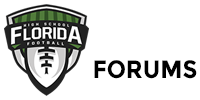-
Posts
-
By Joshua Wilson · Posted
KIPP is new and will be fielding a team for sure. Sarasota Christian and Old Plank are moving up from SSAA 8-Man to SSAA 11-Man Innovation in Orlando will be the newest public high school in the state. In 2026 Sounside in Gulf Breeze will open as the Soundside Hurricanes. First new school in Santa Rosa County in 25 years when Navarre opened in 2001. -
By Vero Indian · Posted
Wow so BTW is traveling to both Vero and Lakeland this year that's nuts -
By nolebull813 · Posted
Deer Jerkey https://highschool.athlonsports.com/florida/2024/04/23/florida-high-school-football-deerfield-beach-announces-2024-schedule -
By Longtime Observer · Posted
Have to see how the transfer class comes together. Probably underdogs at Traz vs. the Rockets and favorites at home vs. BTW. Of course, both games could go either way.
-
-
Who's Online (See full list)
-
Popular Contributors
-
1
-
2
-
3
-
4
-
5
-








Recommended Posts
Join the conversation
You can post now and register later. If you have an account, sign in now to post with your account.